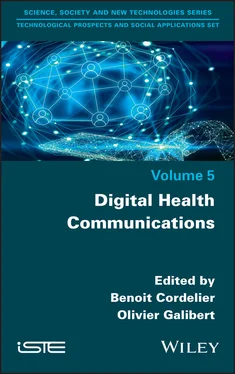Digital Health Communications
Здесь есть возможность читать онлайн «Digital Health Communications» — ознакомительный отрывок электронной книги совершенно бесплатно, а после прочтения отрывка купить полную версию. В некоторых случаях можно слушать аудио, скачать через торрент в формате fb2 и присутствует краткое содержание. Жанр: unrecognised, на английском языке. Описание произведения, (предисловие) а так же отзывы посетителей доступны на портале библиотеки ЛибКат.
- Название:Digital Health Communications
- Автор:
- Жанр:
- Год:неизвестен
- ISBN:нет данных
- Рейтинг книги:3 / 5. Голосов: 1
-
Избранное:Добавить в избранное
- Отзывы:
-
Ваша оценка:
- 60
- 1
- 2
- 3
- 4
- 5
Digital Health Communications: краткое содержание, описание и аннотация
Предлагаем к чтению аннотацию, описание, краткое содержание или предисловие (зависит от того, что написал сам автор книги «Digital Health Communications»). Если вы не нашли необходимую информацию о книге — напишите в комментариях, мы постараемся отыскать её.
Digital Health Communications — читать онлайн ознакомительный отрывок
Ниже представлен текст книги, разбитый по страницам. Система сохранения места последней прочитанной страницы, позволяет с удобством читать онлайн бесплатно книгу «Digital Health Communications», без необходимости каждый раз заново искать на чём Вы остановились. Поставьте закладку, и сможете в любой момент перейти на страницу, на которой закончили чтение.
Интервал:
Закладка:
[HAS 19] HASSANI N., “Hyperconnexion des Community Managers : injonction ou propension ?”, Communication & Organisation , vol. 56, no. 2, pp. 93–107, 2019.
[JAC 02] JACQUINOT-DELAUNAY G., “Au-delà du modèle canonique de la relation maître-élève : les TIC ou comment faire circuler les signes de la présence”, in GUIR R. (ed.), Pratiquer les TICE, former les enseignants et les formateurs à de nouveaux usages , De Boeck, Brussels, 2002.
[JAU 11] JAUREGUIBERRY F., PROULX S., Usages et enjeux des technologies de communication , Érès, Toulouse, 2011.
[JOU 00] JOUËT J., “Retour critique sur la sociologie des usages”, Réseaux , vol. 100, no. 2, pp. 487–521, 2000.
[JOU 13] JOUËT J., LE CAROFF C., “Chapitre 7 – L’observation ethnographique en ligne”, in BARATS C. (ed.), Manuel d’analyse du web en Sciences Humaines et Sociales , Armand Colin, Paris, 2013.
[KIV 09] KIVITS J., LAVIELLE C., THOËR C., “Internet et santé publique : comprendre les pratiques, partager les expériences, discuter les enjeux”, Santé Publique , vol. 21, pp. 5–12, 2009.
[KIV 15] KIVITS J., GENDARME S., “8 – Les institutions publiques, Internet et la santé : de l’offre publique aux usages privés”, in MEIDANI A. (ed.), La santé : du public à l’intime , Presses de l’EHESP, Rennes, 2015.
[LAF 07] LAFON B., PAILLIART I., “Malades et maladies dans l’espace public”, Questions de communication , no. 11, pp. 7–15, 2007.
[LEM 09] LEMIRE M., “Internet et responsabilisation : perspective de l’usager au quotidien”, Santé Publique , vol. 21, pp. 13–25, 2009.
[LEP 02] LEPINE V., “Une entreprise sidérurgique aux prises avec le groupware : apports d’une étude empirique”, Les enjeux de l’information et de la communication , no. 1, pp. 65–74, 2002.
[LEP 13] LEPINE V., PARENT B., “De la visibilité à l’individuation des cadres hospitaliers : l’obstacle de la dyschronie”, Communication & Organisation , vol. 44, no. 2, pp. 41–52, 2013.
[MAR 16] MARCOCCIA M., Analyser la communication numérique écrite , Armand Colin, Paris, 2016.
[MAY 12] MAYERE A., BAZET I., ROUX A., “‘Zéro papier’ et ‘pense–bêtes’ à l’aune de l’informatisation du dossier de soins”, Revue d’anthropologie des connaissances , vol. 6, no. 1, pp. 115–139, 2012.
[MEA 10] MEADEL C., AKRICH M., “Internet, tiers nébuleux de la relation patient-médecin”, Les Tribunes de la santé , vol. 29, no. 4, pp. 41–48, 2010.
[MED 11] MEDINA AGUERREBERE P., “La diffusion online de la marque hospitalière : le cas des hôpitaux français”, Quaderni , no. 74, pp. 97–104, 2011.
[MIE 17] MIEGE B., Les industries culturelles et créatives face à l’ordre de l’information et de la communication , Presses universitaires de Grenoble, Grenoble, 2017.
[MOE 10] MOEGLIN P., Les industries éducatives , PUF, Paris, 2010.
[ODI 11] ODIN R., Les espaces de communication. Introduction à la sémio-pragmatique , Presses universitaires de Grenoble, Grenoble, 2011.
[OLI 19] OLIVERI N., PELISSIER N., “Repenser les dispositifs numériques des organisations au prisme des risques technosociaux (rts), identification, évaluation, prévention”, Les Cahiers du numérique , vol. 15, no. 4, pp. 87–111, 2019.
[OLL 15] OLLIVIER-YANIV C., “La communication publique sanitaire à l’épreuve des controverses”, Hermès, La Revue , vol. 73, no. 3, pp. 69–80, 2015.
[OUM 18] OUMRANE D., MIGNOT M., “Préventions des cancers du sein : ce que la controverse fait à l’action publique”, Les enjeux de l’information et de la communication , vol. 19, no. 3, pp. 41–55, 2018.
[PAG 14] PAGANELLI C., CLAVIER V., “S’informer via des médias sociaux de santé”, Le temps des médias , no. 23, winter, 2014.
[PAR 16] PARRINI-ALEMANNO S., “Chapitre 12 – Recomposition organisationnelle à l’aune de la confiance généralisée : l’exemple des Institutions de soins en France”, in DELAYE R. (ed.), La confiance : relations, organisations, capital humain , EMS Éditions, Caen, 2016.
[PER 89] PERRIAULT J., La logique de l’usage essai sur les machines à communiquer , Flammarion, Paris, 1989.
[PER 12] PERAYA D., MARQUET P., HÜLSMAN T. et al. , “Médiation, médiations…”, Distances et médiations des savoirs , no. 1 [Accessed 22 January 2014], 2012.
[PIG 09] PIGNIER N., “Sémiotique du webdesign : quand la pratique appelle une sémiotique ouverte”, Communication & Langages , vol. 159, no. 1, pp. 91–110, 2009.
[PRO 00] PROULX S., LATZKO-TOTH G., “La virtualité comme catégorie pour penser le social : l’usage de la notion de communauté virtuelle”, Sociologie et sociétés , vol. XXXII, no. 2, pp. 99–122, 2000.
[PRO 06] PROULX S., Communautés virtuelles penser et agir en réseau , Les Presses de l’université Laval, Quebec, 2006.
[REN 07] RENAUD L., RICO DE SOTELO C., “Communication et santé : des paradigmes concurrents”, Santé Publique , vol. 19, pp. 31–38, 2007.
[ROM 10] ROMEYER H., La santé dans l’espace public , Presses de l’EHESP, Rennes, 2010.
[SAL 16] SALGUES B., Health Industrialization , ISTE Press Ltd, London and Elsevier Ltd, Oxford, 2016.
[STI 07] STIEGLER B., “Questions de pharmacologie générale. Il n’y a pas de simple pharmakon”, Psychotropes , vol. 13, no. 3, pp. 27–54, 2007.
[VAL 15] VALLANCIEN G., La médecine sans médecin. Le numérique au service du malade , Gallimard, Paris, 2015.
Acknowledgments
We would like to warmly thank Bruno Salgues, in charge of the “Technological Prospects and Social Applications” Set at ISTE Group, for his advice, his proofreading and his patience in the writing and editing process.
This book is the culmination of years of efforts and collaborations, exchanges, study days at UQAM and the University Burgundy Franche-Comté, and symposiums within the ACFAS ( Association francophone pour le savoir ) and ICA (International Communication Association) congresses. We would like to thank the researchers with whom we exchanged views on these occasions. In particular, we would like to thank Sylvie Parinni Alemanno of the DICEN-IDF laboratory (CNAM) and Christine Thoër, former director of ComSanté, as well as their teams, for their valuable logistical and financial contributions to the organization of the “Organization, Digital Health” study days in 2017.
The entire project would also not have been possible without the unwavering support of the French, Canadian and Quebec funding agencies that support our research teams. For CIMEOS (EA 4177) and the LIPSTIC laboratory of excellence: the Agence nationale de la recherche (Labex LipSTIC, ANR-11-LABX-0021), the Burgundy-Franche-Comté Region and the European Regional Development Fund. For the ComSanté research center: the Social Sciences and Humanities Research Council (SSHRC), the Fonds de recherche du Québec – Société et culture (FRQSC), the Conseil de la recherche et de la création (COREC, UQAM).
1 Acknowledgments written by Benoit CORDELIER and Olivier GALIBERT.
Author Biographies
Pénélope Codello
Pénélope Codello, PhD, is a professor at HEC Montréal. Her research and teaching focus on soft skills and personal development; her work also focuses on education sciences and managerial perspectives. Codello is interested in the analysis of social cohesion in leadership development and is also a Gestalt coach. Finally, she also exercises major responsibilities in the educational and administrative management of her school.
Читать дальшеИнтервал:
Закладка:
Похожие книги на «Digital Health Communications»
Представляем Вашему вниманию похожие книги на «Digital Health Communications» списком для выбора. Мы отобрали схожую по названию и смыслу литературу в надежде предоставить читателям больше вариантов отыскать новые, интересные, ещё непрочитанные произведения.
Обсуждение, отзывы о книге «Digital Health Communications» и просто собственные мнения читателей. Оставьте ваши комментарии, напишите, что Вы думаете о произведении, его смысле или главных героях. Укажите что конкретно понравилось, а что нет, и почему Вы так считаете.












